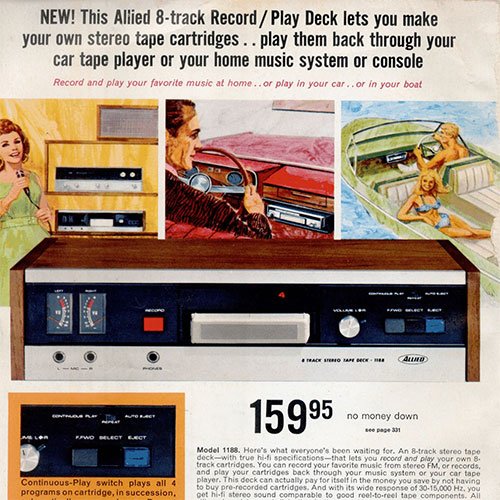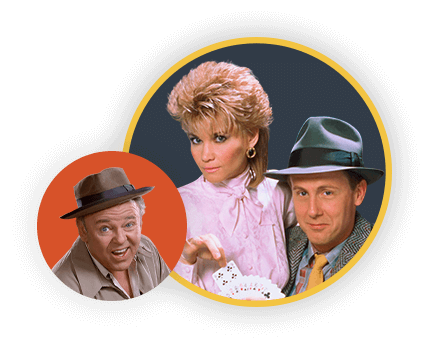The 10 most desired tech gifts of the 1970s, year by year

The Seventies were truly the start of the digital age. Electric watches and calculators glowed with red LED displays. Video arcades began to replace pinball. Television and cameras were suddenly pocket-sized. You could record The Love Boat and watch it later.
Some people have to have the latest gadget. As soon as it hits the stores. The following items may not have all been the best-selling items that year, but they were cutting-edge. This was brand-new tech that year.
Let's take a look at some of the hottest tech introductions of the 1970s!

1970: Panasonic TR-001 IC TV
See, kids? We could "stream" our favorite shows on the train in the 1970s, too. Panasonic introduced one of the world's first pocket television to market in 1970. With its oblong shape and tiny, square screen, the thing looked more like a video camera than a TV set. But it could fit inside a pocket — or stocking, as this ad proudly declared.
Image: Panasonic

1971: Recordable 8-Track System
8-Track tapes had been around since the mid-'60s, installed in Ford automobiles and available for home sound-systems. Music lovers could buy their weirdly sequenced copies of Let It Be or Let It Bleed on 8-Track. But a major leap was later made — consumers could now record onto the 8-Track cassettes with decks like this 1971 model. The cost? About $1,000 in today's money.
Image: Radio Shack

1972: Philips N1500 Video Cassette Recorder
Speaking of home recording, another massive leap was made in the early 1970s with video. Sony released its U-matic system in 1971, but that was for professional use. In 1972, Philips brought Video Cassette Recording into living rooms with its N1500 VCR, a pioneering consumer model. All you needed was a big enough coffee table to hold it up. And a ton of money.
Image: Philips

1973: Kodak Pocket Instamatic 110
Remember the film for a Kodak 100 instant camera? The black film cartridges looked kind of like a telephone receiver or a stretched-out capital B. The easy, pop-it-in format revolutionized amateur photography. The 110 was introduced in 1972, with cheaper plastic models like the Kodak Pocket Instamatic 10 following. Millions were sold. Which means tens of millions of flash cubes were sold. It also helped to have Eve Plumb from The Brady Bunch in commercials — alongside Mark Hamill!
Image: Sears

1974: Hewlett-Packard HP-65
Now we are getting into nerdy territory, but what can we say? We are nerds. Scientific, graphic calculators changed the way we did math homework. The HP-65 was the first magnetic card-programmable handheld calculator. No wonder it cost close to $800 — back then! Gulp!
Image: Hewlett-Packard

1975: Pong Game Console
Who needs Fortnite when you can have two sticks knocking a tiny square back and forth? Pong kicked off the whole home video game era. Atari introduced a Pong console (which, yes, only played Pong and Pong varieties — with no cartridges) in 1975, selling them through the Sears catalog. They quickly proliferated and a few knock-offs followed. It was the hottest thing in home gaming… until our 1977 item.
Image: JC Penney

1976: Texas Instruments Digital Watch
Digital watches were expensive when they first came out. Texas Instruments brough the tech to the people. In 1976, T-I introduced a $20 LED watch to the marketplace which shocked the tech world. A couple of years earlier, a similar device would sell for $125. Before T-I unveiled this at the 1976 Chicago Consumer Electronics Show, digital watches ran about $50. That huge price slash made them hot — and not long after they were down to $10!
Image: Sears

1977: Atari 2600
The joystick era begins. At launch, just nine games were available, and one of them was math: Air-Sea Battle, Basic Math, Blackjack, Combat, Indy 500, Star Ship, Street Racer, Surround and Video Olympics.
Image: Atari

1978: Speak & Spell
You know, it's what E.T. used to phone home in 1982. Coincidentally, Reese's Pieces were also introduced around the same time, in 1977. E.T. was a big fan of the late 1970s.
Image: Sears

1979: The DustBuster
Tostitos and Honey Nut Cheerios first hit grocery stores in 1979. Those left a lot of crumbs. What better way to suck them up off the counter than this handy handheld vacuum? The DustBuster became a symbol of 1980s convenience, even turning up as an "antique" in Back to the Future II.
Image: Black & Decker




